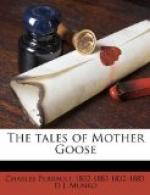One evening, as she was, according to her custom, rambling round about the courts and yards of the palace to see if she could smell any fresh meat, she heard, in a room on the ground floor, little Day crying, for his mamma was going to whip him, because he had been naughty; and she heard, at the same time, little Dawn begging mercy for her brother.
The Ogress knew the voice of the Queen and her children at once, and being furious at having been thus deceived, she gave orders (in a most horrible voice which made everybody tremble) that, next morning by break of day, they should bring into the middle of the great court a large tub filled with toads, vipers, snakes, and all sorts of serpents, in order to have the Queen and her children, the chief cook, his wife and maid, thrown into it, all of whom were to be brought thither with their hands tied behind them.
They were brought out accordingly, and the executioners were just going to throw them into the tub, when the King, who was not so soon expected, entered the court on horseback and asked, with the utmost astonishment, what was the meaning of that horrible spectacle.
No one dared to tell him, when the Ogress, all enraged to see what had happened, threw herself head foremost into the tub, and was instantly devoured by the ugly creatures she had ordered to be thrown into it to kill the others. The King was of course very sorry, for she was his mother; but he soon comforted himself with his beautiful wife and his pretty children.
LITTLE THUMB.
Once upon a time there was a fagot-maker and his wife, who had seven children, all boys. The eldest was but ten years old, and the youngest only seven.
They were very poor, and their seven children were a great source of trouble to them because not one of them was able to earn his bread. What gave them yet more uneasiness was that the youngest was very delicate, and scarce ever spoke a word, which made people take for stupidity that which was a sign of good sense. He was very little, and when born he was no bigger than one’s thumb; hence he was called Little Thumb.
The poor child was the drudge of the household, and was always in the wrong. He was, however, the most bright and discreet of all the brothers; and if he spoke little, he heard and thought the more.
There came a very bad year, and the famine was so great that these poor people resolved to rid themselves of their children. One evening, when they were in bed, and the fagot-maker was sitting with his wife at the fire, he said to her, with his heart ready to burst with grief:—
“You see plainly that we no longer can give our children food, and I cannot bear to see them die of hunger before my eyes; I am resolved to lose them in the wood to-morrow, which may very easily be done, for, while they amuse themselves in tying up fagots, we have only to run away and leave them without their seeing us.”




